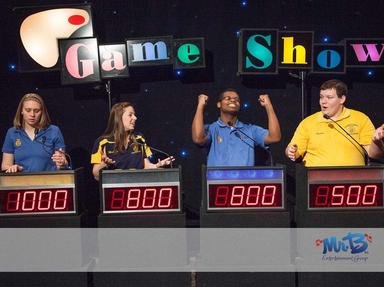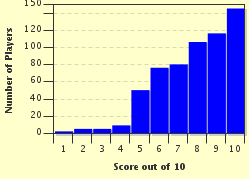Quiz Answer Key and Fun Facts
1. Assuming all the Daily Doubles were in the lowest money values, nobody else answered any questions correct, among a few other scenarios, it is possible to win a total of $566,400 dollars in a single episode. What game show is this?
Note: To win $566,400, the money figures on the board are the increased amounts first seen in 2001...
2. The highest you can win on a certain game show (hosted by Alex Trebek) is $566,400, assuming all the conditions are met. Keeping this in mind, what is the LOWEST score possible, assuming all conditions are correct, on this game show?
Hint: Think about this carefully; it is actually much easier than it appears.
Note: This is using the money values from the 2001 (and later) version of the game show. Money amounts were twice as much in 2001 as they were in the earlier decades.
3. First you have to land on the million dollar wedge. Then you have to guess a letter that is in the puzzle. Then you have to win the round by solving the puzzle. Throughout the rest of the game, you have to avoid landing on the bankrupt wedge. Then you have to win more money than anyone else to get to the bonus round. Next, you have to land on the unknown prize wedge with the million dollars. Then you have to solve the puzzle correctly.
Voila, you've won a million dollars!
Sound's impossible, but Michelle Lowenstein proved it is indeed possible. What game show scenario is described above?
4. Spin the wheel 45 times straight without hitting a single whammy. That sounds impossible, but one man proved it is indeed possible. Of course, many accused Michael Larson of cheating, because he had memorized the board's pattern. He knew what would and wouldn't work.
What game show did Michael Larson "beat"?
5. During the "Showcase", two players compete to try to win one of two prizes. Of course, it is possible (though fairly unlikely) to win both your own prize and the other person's prize. The object is to guess how much your prize package is worth. If your guess is closer to the real price (without going over) than your opponent's guess, you win your prize. But if you guessed correctly within $100 of the actual retail value, you win the other person's prize as well! On what game show would this occur?
6. To win $120,000 on this game show, quite a few criteria must be met, making this feat improbable; but not impossible. The team of five must win against the other team, and make it to the "Fast Money" round. In this round, two team members try to earn 200 points, which wins them 20,000 dollars. They return the next day and do it all again. If they can beat the other team, win 200 points in every "Fast Money" game they play, they will win a total of $120,000 and a new car. What game show is this?
7. When Chuck Woolery hosted this game show, the winners of the game would advance to the final round. If they won the $5,000 prize, great! If not, $1,000 would be added to that to make it $6,000. $1,000 would be continually added until the jackpot was won. The jackpot even reached well over $35,000 before someone finally won! To have that many people lose, then one person finally win such a high amount is highly improbable, but obviously not impossible. What game show is this?
8. The highest amount of money a contestant could win on this game show was a nice $50,000. The reason was because this was the maximum amount of money allowed to be won. If the player was able to keep winning, they could keep coming back. But once they were dethroned, or reached $50,000, their reign would end. On which card-flipping show did players have to guess whether the next card was higher or lower?
9. Drew Carey hosted a very short-lived game show where two players would compete by trying to determine the results of polls (surveys) taken, and the first to three would move on to the final round. In the final round, they would answer more polls and try to win up to $10,000,000 in cash. Of course, the game is extremely difficult, and winning the ten million seems impossible. But, of course, nothing is impossible, however improbable it may be. What game show is this?
10. On this game show, hosted by Jerry Springer, almost every contestant on the show won the exact same thing; a person. The game show is a blind-date type show, and the contestant would narrow down their choice by finding out some of the bachelor's (or bachelorette's) secrets.
What's improbable about this? Well, I would imagine that it is very improbable (and possibly impossible) that the winner of the show ever made it past a first date.
What dating show is this?
Source: Author
salami_swami
This quiz was reviewed by FunTrivia editor
kyleisalive before going online.
Any errors found in FunTrivia content are routinely corrected through our feedback system.

